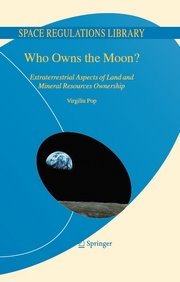Patric Ionescu writes on his blog:
"I just found out that the sun is soon to be owned by somebody. This guy, Virgiliu Pop, who by the name seems to be a romanian (which makes me proud I must say) claimed ownership of the sun.
Here's the claim. Here's the article about this intriguing fact.
Do not be fooled. The guy wants to demonstrate the absurdity of the etraterrestrial property agencies (you know, those guys who offer to sell you pieces of land on the moon and such). Yet, if he owns the sun he might start to like the power :)
I think I must get as much tan as possible before he starts charging for it."
Thursday, August 5, 2004
Atozed: "All your base are belong to us?"
Sunday, May 23, 2004
"The Space Show" with Dr. David Livingston
 Dr. David Livingston hosts me on "The Space Show", were we talk about the issue od "extraterrestrial real estate". The Space Show® focuses on timely and important issues influencing the development of outer-space commerce and space tourism, as well as other related subjects of interest to us all.
Dr. David Livingston hosts me on "The Space Show", were we talk about the issue od "extraterrestrial real estate". The Space Show® focuses on timely and important issues influencing the development of outer-space commerce and space tourism, as well as other related subjects of interest to us all.
Saturday, May 8, 2004
Hurriyet: "4 bin metrekaresi 30 dolara Ay’da tapulu arazi"

From Hurriyet, a Turkish newspaper, an article on "selling" the Moon (http://webarsiv.hurriyet.com.tr/2004/08/05/501230.asp):
"Bu yasadaki tek sorun ise şu: Bu kontratın altında bugüne kadar örneğin Pakistan, Fas veya Meksika gibi sadece on ülkenin imzası bulunurken uzay yolculukları yapan devletlerin hiçbirisi bu sözleşmeyi imzalamadı. Bu açıdan bakıldığında sözleşmenin hiçbir anlamı yok diyor Glasgow Üniversitesi hukuk uzamı ve Uluslararası Uzay Hakları Enstitüsü üyesi Virgiliu Pop. Ve uzay yolculukları yapan devletlerin çekimser kalmaları Ay sözleşmesindeki 11.maddeyle ilgili. Bu madde, sözleşmeyi kabul eden devletlerin Ay’dan yararlanma konusunda anlaşmalarını ve halihazırdaki tüm kazanımları de diğer ülkelerle bölüşülmesini öngörüyor."
Wednesday, February 11, 2004
Newhouse News Service: "Questions of Property Rights May Bedevil Private Ventures in Space"

2004, February 11th. Newhouse News Service publishes "Questions of Property Rights May Bedevil Private Ventures in Space" by Margie Wylie, after interviewing me - "But even if simply asserting ownership could make the moon Hope's, he is a Johnny-come-lately. Virgiliu Pop, a space law expert and lecturer at the University of Lille 2 in Lille, France, points out that between 1950 and 1970 alone, there were at least four other moon claims"
Sunday, February 8, 2004
La Tercera: "Venta de terrenos en la Luna y planetas cercanos se convierte en moda comercial"

2004, February 8th. I am interviewed by Marcelo Córdova Silva, a journalist for the Chilean daily La Tercera. His article - "Venta de terrenos en la Luna y planetas cercanos se convierte en moda comercial" speaks about -
"Virgiliu Pop, investigador de la U. de Glasgow (Escocia) y del Instituto Internacional de Ley Espacial, dijo a La Tercera que lo único que se obtiene de gente como Hope es un trozo de papel que no da derechos de posesión. "Aunque la ley reconociera la propiedad privada en el espacio, Hope no sería dueño de la Luna. El sólo afirmó que la poseía, tal como alguien dice que es Dios o el Rey del Mundo", explica. Incluso, en 2001 Pop inscribió el Sol a su nombre en el Instituto de Registros Arquímedes para "mostrar cuán ridículo es decir que es mío porque yo lo digo. Si alguien dice que la Luna es suya, creo que debería pagarme por la luz que recibe de mi propiedad"."
Monday, February 2, 2004
Amcgltd.com: "How About Some Cheese Instead? "
Scott at amcgltd.com (http://www.amcgltd.com/archives/2004_02.html) writes:
"Space.com is carrying this detailed report on a business you probably don't know exists yet is amazingly profitable... selling lunar real-estate:
Every day hundreds of people fork over about $30 for 1-acre slices of the Moon and Mars. (Prices are going up: For roughly the same amount, prior to 2001, you could get 17,700 acres.) The cost includes shipping and handling of a deed, a map, and the lunar or Martian "Constitution and Bill of Rights," all printed on simulated parchment.
A lot of leftist back-and-forth about whether or not someone can sell chunks of something when there's nobody to actually buy it from in the first place. I particularly liked the blatherings of one Virgiliu Pop, a British legal scholar:
One precedent Pop draws on involves the Masai tribe in Africa, which "has a similar legal claim over all the cows in the world, yet in reality, people all over the world continue to buy and sell cattle without involving the Masai. What I dispute here is the 'it is mine because I say so' approach."
If the Masai were in charge of, say, the same resources as Germany we would take their claims far more seriously, probably devoting a whole section of the UN's world court to debate the matter endlessly while diplomats parked on the sidewalks of Manhattan and sent their daughters to Bloomingdale’s. If they controlled the resources of, say, the United States, we'd all be paying a cow tax.
Ownership of the moon depends a lot on whether or not there's anything on the moon worth owning. If it's all just dust and gravel, I fully expect some sort of high-minded international agreement along the lines of what works in Antarctica. If, on the other hand, a meteor blew the top of a mountain off and revealed, say, a gold deposit the size of Brazil, I fully expect it to be settled the old fashioned way... last one to the top the hill is a Frenchman!"
Space.com: "Lunar Land Grab: Celestial Real Estate Sales Soar"

February 2nd, 2004, United States. I am interviewed by Robert Roy Britt of Space.com. His article, "Lunar Land Grab Celestial Real Estate Sales Soar" states, inter alia:
"In a crafty stunt designed to "expose the phony extraterrestrial real estate industry," British legal scholar Virgiliu Pop declared in 2001 that he owns the Sun and can charge the "owners" of other solar system bodies for the solar energy they receive. Pop has written several papers on space property rights and is a member of the IISL. "The Lunar Embassy does not own the Moon, hence it cannot sell it," Pop said in an e-mail interview. "If you still believe you can actually own the Moon by buying it from the Lunar Embassy, then you will have to pay me utilities fees for the Sun that I own as much (or as little) as Mr. Hope owns the Moon." One precedent Pop draws on involves the Masai tribe in Africa, which "has a similar legal claim over all the cows in the world, yet in reality, people all over the world continue to buy and sell cattle without involving the Masai. What I dispute here is the 'it is mine because I say so' approach." A cornerstone of Lunar Embassy's claims -- the absence of governmental protest -- is irrelevant, Pop argues, because no protest or response was to be expected "with such trivial claim" in light of accepted international law. Pop further contends that Dennis Hope's quest, which began in 1980, came too late. "A lunar claim was lodged in Chile back in 1953," Pop says, "and a Declaration of Lunar Ownership was issued by the city of Geneva, Ohio, back in 1966."
So why don't governments put a stop to all this? "Perhaps -- and this is my opinion, not the government’s -- this is because the government is concerned right now with more important issues," Pop said. "Yet, I hope one day the government will pay attention to the Lunar Embassy’s antics."
Robert Roy Britt's article appears also on MSNBC under the title "Could lunar real estate spark a future war?"
Friday, January 23, 2004
"Cap de afis" with Simona Pele, Radio Timisoara
 Radio Timisoara's Simona Pele hosts a 35-minute long interview with me on the show "Cap de Afis", where we discuss about the issue of extraterrestrial real estate.
Radio Timisoara's Simona Pele hosts a 35-minute long interview with me on the show "Cap de Afis", where we discuss about the issue of extraterrestrial real estate.
Monday, January 19, 2004
Is Space Exploration Worth the Cost?
I published this article on spacedaily.com -
The new space policy of the Bush administration, aimed at taking the humankind back to the Moon and on to Mars, came under fire before even being released. In their bid at the Democratic nomination for the White House, several politicians criticized George W. Bush's grand space plans, arguing that the money would find a better use here, on Earth.
"I also want to explore planet Earth and planet D.C.," Dennis Kucinich said. Al Sharpton too suggested that Bush instead try to discover the lower-income parts of Washington. "I mean, it won't cost as much ... and it would be just as enlightening for him".
Joseph Lieberman stated that the money would be needed "right here on Earth to give health care that's affordable to ever! Ybody, to improve our education system, and do better on veterans' benefits and homeland security". And Howard Dean agreed that "space exploration is terrific", but went on to ask – "Where is the tax increase to pay for it? It is not worth bankrupting the country."
Since the beginning of the space era, it has been argued that the money spent on space exploration should rather be used on meeting the needs of the underprivileged. "If our nation can spend … twenty billion dollars to put a man on the moon, it can spend billions of dollars to put God's children on their own two feet right here on earth." – were stating respected figures like Martin Luther King Jr.
People like him were not necessarily opposing space exploration; they were instead disputing the priorities – is space exploration worth pursuing when money is so badly needed elsewhere? Unfortunately, the benefits of the space exploration are not self-evident, no matter how real they are. And people are genuine in their worry that money is being wasted in space. Their concern with spending priorities needs to be addressed.
The high profile of space exploration makes it appear more expensive than it actually is. The uninformed, yet caring citizen, is under the earnest impression that the money would make a genuine difference in the fight against poverty. The real dimensions of the social needs are, in reality, out of proportion with the money spent in space – be it in the past, now or in the immediate future. Otherwise, there won't be any social needs left after the Congress stopped funding the Apollo missions to the Moon.
In the same time, many of the critics of the space programme on social grounds are "limousine liberals". They point the finger at the US government for wasting their tax money in space instead of helping the poor, but they are not feeling guilty for their own consumerist life style and for their own scale of priorities.
For instance, this year, total pet-related sales in the United States are projected to be $31 billion – the double, almost to the cent, of the $15.47 billion NASA budget. An estimated $5 billion worth of holiday season gifts were offered – not to the poor – but to the roving family pets – six times more than NASA spent on its own roving Martian explorers, Spirit and Opportunity, who cost the American taxpayer $820 million both. Instead of providing a launch pad for the immorally expensive shuttles, Florida can do better and clothe the underprivileged - a genuine alligator pet collar cost only $400 a piece.
Are space rockets expensive toys for the big boys? In any case, they cost less than the $20.3 billion a year spent in the US on the human popular toy industry. One doesn't need toys to play with when the most popular game is playing deaf and blind to the needs of the poor – provided one criticizes the waste in space.
Instead of betting on the future, Americans spend $586.5 billion a year on gambling. It is perhaps immoral to criticize one's personal choice, so instead of kicking the habit and feeding the poor with this money, one should stop instead the enormous waste in space who stands at a scandalous amount of 40 times less than gaming tokens.
Speaking about personal choice, $31 billion go annually in the US on tobacco products - twice the NASA budget -, and $58 billion is spent on alcohol consumption -almost four times the NASA budget. Forget space spin-offs – here are genuine tangible benefits: $250 billion are spent annually in the US on the medical treatment of tobacco- and alcohol-related diseases - only sixteen times more than on space exploration.
In the eve of the launch of Apollo 11, a moving event occurred at NASA's moonport. Reverend Ralph Abernathy, president of the Southern Christian Leadership Conference and heir to Martin Luther King Jr., came to Cape Canaveral together with several hundred members of the Poor People's Campaign, to protest the money being spent on space exploration, while so many people remained poor.
He was met by Thomas Paine, the administrator of NASA, who was informed that in the face of such suffering, space flight represented an inhuman priority and funds should be spent instead to feed the hungry, clothe the naked, tend the sick, and house the homeless.
Paine enlightened the good reverend that the advances in space exploration were child's play compared to the tremendously difficult human problems of the society, and told him that "if we could solve the problems of poverty by not pushing the button to launch men to the moon tomorrow, then we would not push that button."
Here are $976.3 billion dollars – almost a trillion - spent every year in the US on pets, toys, gambling, alcohol and tobacco. It is 63 times the amount spent on space exploration – with the difference that NASA has not destroyed lives as the alcohol, tobacco and gambling did. It is not the exploration spirit that Americans need to give up in order to alleviate poverty. It is the consumerist spirit.
Instead of not pushing the button, why not kick the habit?





